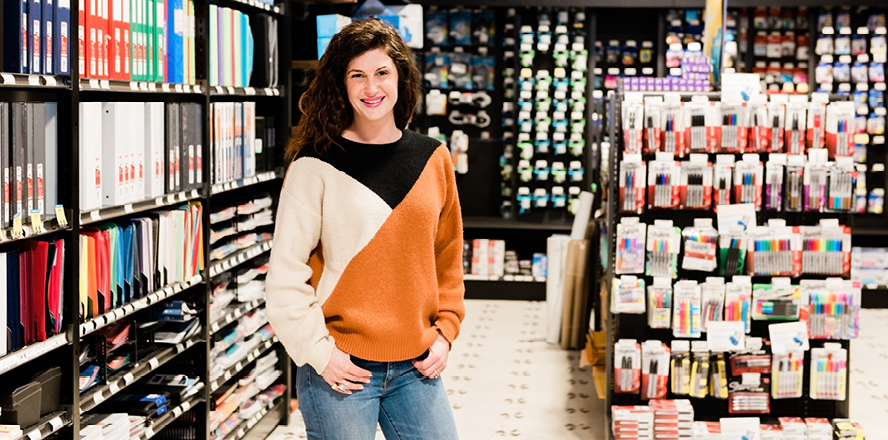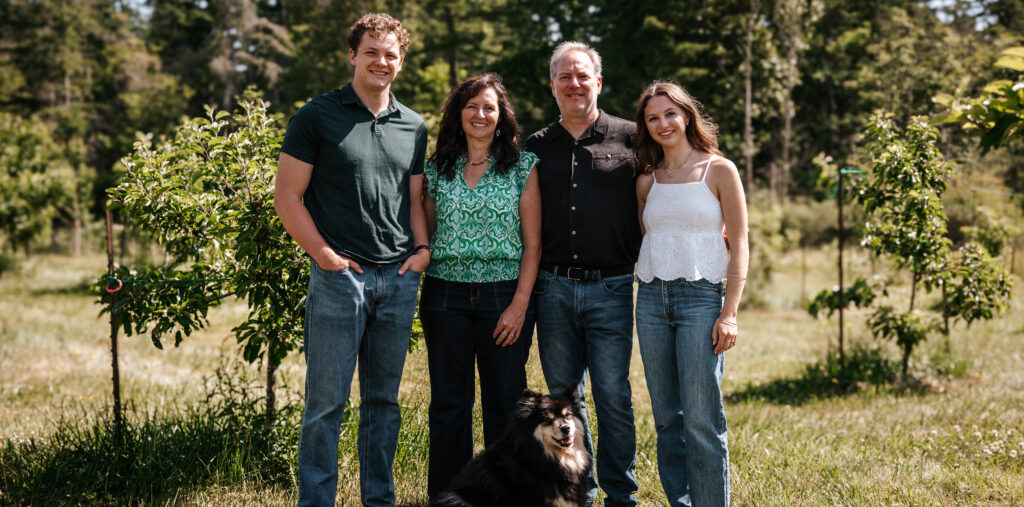by Deborah Rogers –
Women make up just over half the population, and with changes in education, employment policy and societal norms, are working in more diverse careers than ever. There are some jobs though that are still dominated by men. The facts are that only 21% of RCMP are female; less than 4% of people working in the trades are women; less than 20% of those employed in science, technology and engineering jobs are women; and women are underrepresented in leadership roles: as CEOS, on Boards and in politics. We’re proud to present some examples of women in our community who represent the minority in their chosen fields. Representation is one way to open the doors to change.
Caitlin MacKenzie, CEO
It is not very common for a company to have a female CEO, though in private business it’s more common than in the TSX listed companies. Caitlin has been in the role at Monk Office since 2018. As granddaughter of the founder, she was perhaps a natural choice as successor, though she felt it happened sooner than anticipated.
There’s no doubt that being a CEO is a lonely and challenging role, with the ultimate responsibility resting on your shoulders. Having a supportive team who she has great trust in has helped.
It wasn’t a given that Caitlin would be a business high flyer – in fact, school was tough and she left feeling “I would never amount to much.” Street smarts and experience have an equal role to play as well as the skills she brings of determination and perseverance. “I do feel really proud , and honoured, and a bit terrified!” The fear supports the hard work though. As a woman CEO Caitlin is often aware that she’s the only female in a room, and the need sometimes to adjust the way she speaks, or reacts. She thinks it’s a changing demographic in Victoria; it’s a city of “self-starters, men and women.” She feels that women have great skills at reaching out and connecting with one another, which makes for a positive business community.
Cathie Ounsted, Board Member
Cathie has taken leadership roles throughout her career. As well as running a business with her husband, previously she has owned her own businesses, been Director of Operations at Thrifty Foods, been on the Board of the Police Authority, the Board of Peninsula Co-op, been a Councillor for Central Saanich, and is currently on the Board of the Victoria Airport Authority. She’s spent her life in a very male-dominated world, including having two sons (and a male dog) and spending many years organizing a high school football program.
Cathie sees that there has been a change in recruitment policies in an effort to make boards more gender balanced, but she believes skill set should always be the highest priority. She has worked hard all her life, and taking a board role was always a way of satisfying her desire for some corporate involvement, especially when her children were young and she worked less.
Her advice: “Be confident, don’t be afraid to dream big. If you go in with a sense of humour and no chip on your shoulder there’s no reason why you shouldn’t succeed. Don’t bring the sense that you’re not good enough to the table.”
Jennifer Dunn, Software Engineer
Jennifer has worked for the National Research Council at the Herzberg Astronomy and Astrophysics Research Centre for the past 23 years, currently managing several projects as well as managing the software group. She started her career working for Hewlett Packard and then Paramax. She’s honest about the fact that without a specific role model, when working in a low-paid job she saw the highly paid engineers around her and was motivated to study for an engineering degree herself.
She was one of only three women studying Electrical Engineering, and the only woman on her Computer Science minor course. She experienced professors who told her she shouldn’t be on the course, and took to submitting papers with just an initial rather than her full name.
Interestingly, Jennifer’s grown-up daughters have now headed into similar fields and are experiencing the same feeling of being in the minority: but the numbers have changed a little. Why do so few women study STEM subjects? Jennifer thinks that it might be the case that at high school there are still too few role models and not enough encouragement. “They look at university courses and think that what they’ll be doing at university is what they’ll do in a job. But there’s a disconnect. The learning is just the first step. Perhaps not knowing how those skills translate into a job is part of the barrier.”
Jennifer’s federal employer encourages discussion about how to bring more women into science careers, including holding a series of lunch discussions and a survey: “it’s a proactive approach that might help identify and remove some of the challenges.”
For her, seeing more women in science would be exciting – she’s sometimes surprised to find herself in such a minority, but on the whole she thinks there is a gradual increase in the numbers, and more women in these roles will only lead to even more women feeling like it’s a possibility for them. “Sometimes we’re leery of stepping outside the comfort zone, and pushing ourselves to do things that scare us. When I do it, I grow. That will happen for others too, men and women.”
Constable Vanessa Fields
Vanessa has worked in the RCMP for 14 years, following in her father’s and grandfather’s footsteps. Her family wasn’t surprised when she opted to become a Police Officer; the only person who objected was her boyfriend of the time who felt that it “threatened his masculinity and made him feel less of a man.”
While women are underrepresented in the Police Force, they are overrepresented in their client base! Vannesa stressed that work tasks are assigned based on people’s strengths, but all police officers are prepared for all assignments required: “Am I expected to attend a bar brawl and break it up? Absolutely! I’ve come home with a bloody lip.”
Why does she think there are fewer women officers? “Not all women want to go in and get physical. Some women don’t have the assertive personality, or aggression required. The job is getting harder all around too.” But there are times where being female is beneficial: “When it involves female victims, especially sex assault victims.” It’s an area that Vanessa specifically specializes in, especially child sex assaults. Also, “a female police officer is often able to de-escalate a situation.”
Constable Fields pointed out that the current Police Commissioner is a woman, as is the Commanding Officer. There are some great role-models here on the Peninsula for women who want to make policing their career.
April Malis, Electrician
April has nearly completed her apprenticeship and qualified as a Journeyman Electrician. She’s a little older than some of those she studied with through the Women in Trades program at Camosun College, having come to a trades profession after working previously in the horse world, in Calgary.
There was a financial incentive from Camosun that covered the first year of fees, and it really helped April with her decision to try something new, although clearly she’s a practical person and has no fear of getting her hands dirty. It was a small cohort and they had the option to try different specialities. April believes that everyone has their own skill set, so employment shouldn’t be based on gender, rather on the ability to do the job.
“It’s an empowering, fun thing being able to do practical tasks for yourself.” April’s enjoying her career so far, and has become a big advocate for other women to enter the trades; “there’s such a shortage of skilled workers.” She says that women on job sites are definitely in the minority, so they share a camaraderie and although she has encountered an attitude of “you shouldn’t be here” it’s rare, and never put her off.
So why so few women in the trades? “Maybe people stereotype themselves – they just think they can’t do it.” What she can’t deny is that even being an electrician is a physically hard job, and that some trades roles would be too physical for her. There’s lots of mentoring with the company she is with currently. April acknowledges that “mom was a huge role model. She believes there’s nothing I can’t do.” Sometimes it’s a case of reframing fear as a motivation to succeed.
Photos by Janis Jean Photography and Nunn Other Photography




